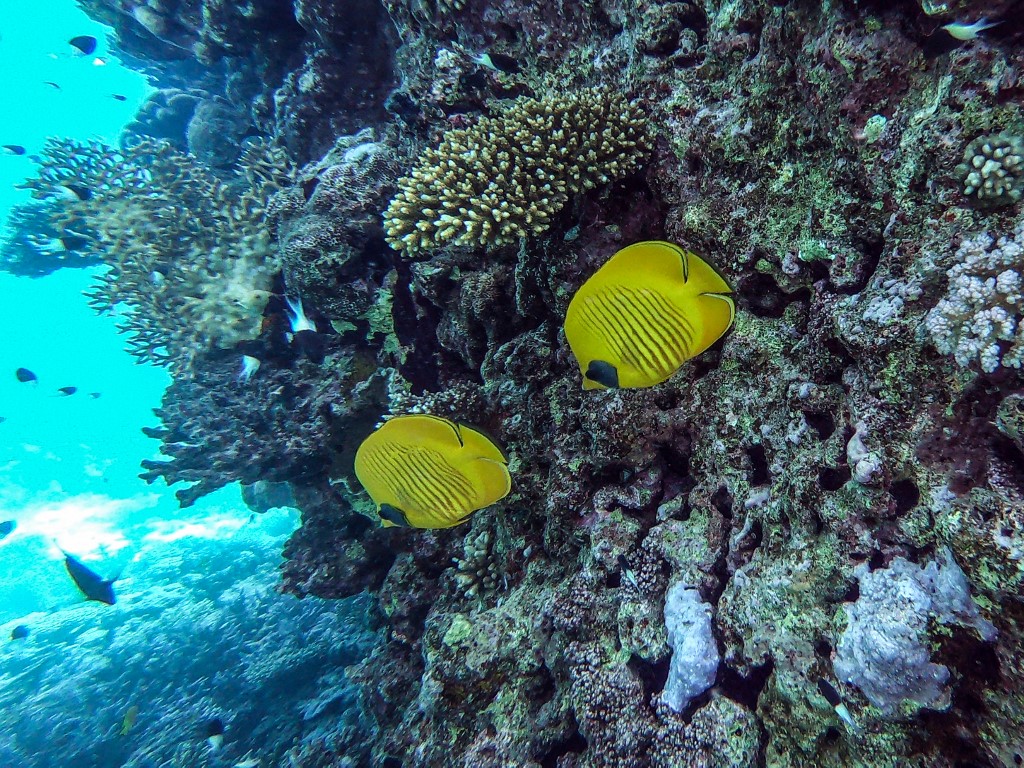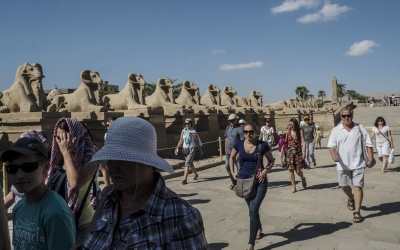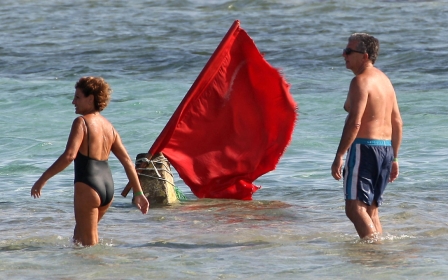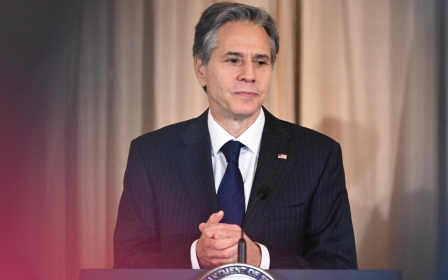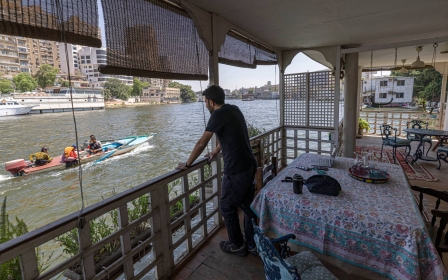Egypt on alert after shark attacks in Red Sea
Egyptian authorities say they are taking measures to protect tourists off Egypt's Red Sea coast, in the wake of shark attacks that killed two foreign tourists near Sahl Hasheesh, a famous bay south of the resort town of Hurghada.
A 68-year-old Austrian woman was killed in an attack by a shark in the area on 1 July.
Three days later, a 40-year-old Romanian woman was killed in another attack, only 600 meters away from the site of the first attack.
'I think we need to create buffer zones where tourists can swim and dive safely'
- Ahmed Idriss MP
It is unclear whether it was the same shark that attacked the two women.
The attacks caused panic in Sahl Hasheesh and in Hurghada in general, and prompted the authorities to close off a stretch of the Red Sea coastline, prohibiting water activities, such as diving, snorkelling, windsurfing and kite sailing.
Officials have also taken a series of measures to protect tourists in the town, including the distribution of written guidance about the things swimmers and divers should not do while in the sea to avoid provoking attacks from sharks.
The authorities, for example, are advising tourists to refrain from throwing food or wearing perfumes while swimming, a town official told Middle East Eye on condition of anonymity, because he was not authorised to speak to the media.
The measures also included the closure of the beach where the aforementioned attacks took place for three days.
The Ministry of Environment has, meanwhile, formed a committee to investigate the incidents.
The committee, the ministry said, would make a scientific study of the circumstances of the two attacks.
It added in a statement that the members of the committee would also try to find the precise reasons for the behaviour of the shark that carried out the attacks.
Panic among tourists
The attacks on the Romanian and Austrian tourists have caused panic among holidaymakers at the Egyptian Red Sea resorts.
Some of those with plans to spend their vacations in the Red Sea have decided to make new arrangements, especially with Egypt also enjoying a long coastline on the Mediterranean, where attacks by sharks had never been heard of.
Egyptian computer engineer Mohamed Fouad has cancelled the reservation he made previously in one of the hotels of southern Hurghada where he would have spent the Eid al-Adha vacation that starts on 8 July.
Instead, he booked in Marsa Matrouh, northwestern Egypt on the Mediterranean.
"An attack by a shark is the worst thing one can face during a vacation," Fouad told MEE.
Fear is palpable on social media as well where those with information about marine life and shark behaviour are trying to spread information about how to act in case of an attack and how to prevent one.
Reports are meanwhile emerging that Egyptian lifeguards were warned about sharks being in the water near Sahl Hasheesh, just minutes before the Austrian tourist was mauled to death.
However, the lifeguards had reportedly laughed off the suggestion.
Some legislators have already called for more action from the authorities to ensure that such attacks do not happen again in the future.
“This is a new phenomenon, which makes it necessary for the authorities to take measures to protect the tourists,” Ahmed Idriss, a member of the Committee on Tourism and Civil Aviation in the House of Representatives (the lower chamber of parliament), told MEE.
“I think we need to create buffer zones where tourists can swim and dive safely.”
Some of the foreign embassies in Egypt have called on their countries' nationals to practice caution, while holidaying in the Arab country.
The Russian consulate in Hurghada called on Russian tourists to strictly abide by the ban on swimming in the areas decided by Egyptian authorities.
Not the first
Some people captured the gory moment of the attack on the Austrian tourist off Sahl Hasheesh last week on film.
Shark attacks are rare in Egypt, but previous attacks that happened in the past decade caused panic and made tourists desert some of the beaches where these attacks happened for days.
In December 2010, four tourists were injured after they were attacked by a shark in the Red Sea resort of Sharm el-Sheikh.
In October 2020, a shark attacked a young Ukrainian boy and an Egyptian tour guide off Sharm el-Sheikh as well.
It happened when a Ukrainian mother and her 12-year-old son were snorkelling with their tour guide in Ras Mohammed national park.
Sharm el-Sheikh and Hurghada are Egypt's top Red Sea resorts that attract millions of tourists and swimming and diving lovers from around the world.
The waters of the two resorts are home to hundreds of species of exotic fish and spectacular corals.
The Hurghada town official said shark attacks are rare in the resort town.
"However, nobody can predict the behaviour of the fish at the same time," the official said.
Nevertheless, the timing of the latest shark attacks could not be worse for Egypt and its tourism sector.
Egypt's tourism economy has been trying to get over the effects the ongoing war in Ukraine.
Russia and Ukraine sent Egypt almost a third of the tourists visiting it in peak years, bringing in billions of dollars to the national treasury annually.
The international economic crisis induced by the war is also affecting the local tourism sector in many ways, including by making travel the preserve of the rich only.
"The ongoing war is having a heavy toll on people's ability to travel outside their countries," independent tourism expert Magdi Selim told MEE.
"The war is opening the door for a global economic crisis and this affects international tourism directly."
The international travel sector expects to lose billions of dollars this year should the war in Ukraine drag on till the end of the year.
Tourism is the nerve centre of the Egyptian economy, accounting for almost 12 percent of GDP and employing almost 10 percent of the national workforce of 29 million.
Effects from the war, including on the tourism sector, are undermining the Egyptian economy and sending Cairo scrambling for aid, including from the International Monetary Fund which is considering a loan request from Cairo to support its social protection system amid rising global food and energy prices.
Tourism promotion tactics
Egypt has been working tooth and nail to mitigate the effects of the war on the tourism sector by changing its tourism promotion tactics.
Egyptian tourism planners are now more focused on Western Europe, Asia and Latin America, areas they believe have not felt the economic pinch from the war yet.
Tourism promotion strategies are also now more oriented towards the Arab market, hoping to attract Arab tourists who used to spend their summer holidays in Europe.
Egypt has also sought alliances, including with regional rivals, such as Turkey, to bring tourists in.
Some of these policies seem to be paying off, raising occupancy rates at hotels in some of the nation's destinations, including in the Red Sea.
On 4 July, 68 charter flights arrived in Hurghada, bringing in around 10,000 foreign tourists to the resort town.
The promotion policies followed by tourism authorities against the background of the war in Ukraine have succeeded in helping the local tourism sector partially overcome the war-induced crisis, tourism officials said.
"These strategies are having noticeable success, but we need to maintain them," Ahmed al-Wasif, the head of the Egyptian Tourism Federation, the guild of the nation's tour operators, told MEE.
"The authorities also need to ease the entry into our country of all types of tourists, which will contribute to increasing arrivals."
This article is available in French on Middle East Eye French edition.
Middle East Eye propose une couverture et une analyse indépendantes et incomparables du Moyen-Orient, de l’Afrique du Nord et d’autres régions du monde. Pour en savoir plus sur la reprise de ce contenu et les frais qui s’appliquent, veuillez remplir ce formulaire [en anglais]. Pour en savoir plus sur MEE, cliquez ici [en anglais].


